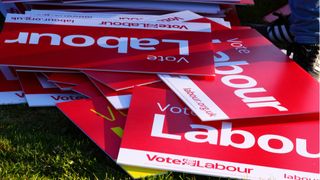Labour pledges free broadband for all the UK
Labour makes fibre broadband pledge by nationalising Openreach

Labour has promised to offer free fibre broadband to everyone in the UK if it wins the General Election.
It has also pledged to nationalise Openreach, BT’s broadband infrastructure division, which would be brought under the control of a new entity called “British Broadband” which would then embark on a nationwide rollout of full fibre infrastructure.
The party says large parts of the country have been underserved in terms of both coverage and speeds by the current model and that its plans would lead to significant societal and economic gains.
- What is 5G? Everything you need to know
- Boris Johnson promises fibre for all UK by 2025
- Openreach could go further
Labour broadband pledge
British Broadband would aim to cover between 14 and 18 million premises within five years and eventually achieve 92 per cent coverage. It would then look to cover the remainder of properties by gaining the necessary access rights.
“A new public service delivering the fastest broadband free to everyone is at the heart of Labour’s plans to transform the future of our economy and society,” said Labour leader Jeremy Corbyn. “The internet has become such a central part of our lives. It opens up opportunities for work, creativity, entertainment and friendship. What was once a luxury is now an essential utility.”
Labour’s policy also appears to suggest that BT Consumer and BT Enterprise would also be brought under public ownership but not EE, BT TV, BT Global Services (BTGS) and other units that do not specifically relate to broadband.
Labour claims to have costed its fibre rollout at £15.3 billion, with the cost of bringing Openreach into public ownership achieved by exchanging shares for government bonds,. It also believes the cost of running a fibre network would be £230 million a year. All of this would be paid for by a new tax on multinational corporations like Amazon, Google and Facebook.
Are you a pro? Subscribe to our newsletter
Sign up to the TechRadar Pro newsletter to get all the top news, opinion, features and guidance your business needs to succeed!
However the plan does not detail the level of investment that would be made available for R&D, nor does it discuss the impact such measures would have on third parties. Labour has promised that all workers in the broadband infrastructure and retail services will be guaranteed jobs on at least the same pay but it is unclear how this would be achieved too.
Full fibre coverage in the UK stands at 10 per cent, significantly less than countries like Japan and South Korea, but also this figure has increased dramatically over the past few years as Openreach embarks on a major rollout of fibre.
So far, Openreach has connected 1.8 million properties to the network – half of which were added over the past 12 months – and is targeting 15 million by the mid-2020s. This target was expanded earlier this year.
The current government target for switching off the UK’s copper network is 2033, but Prime Minister Boris Johnson wants this brought forward to 2025.
'A spectacularly bad take'
The government believes that up to 80 per cent of the country will be covered by commercial deployments from BT and others, and has pledged £5 billion in funding to aid rural rollouts. Some have placed the total cost of extending coverage nationwide – including rural areas – at £30 billion. This is double what Labour is claiming.
“It should be a top political priority to super-charge the roll-out of full fibre broadband and 5G right across the UK so we can build the digital economy of the future,” said a BT spokesperson. “Whatever the result of the election, we’d encourage the next Government to work with all parts of the industry to achieve that. It’s a national mission that’s bigger than any one company.”
Other firms, such as Virgin Media, TalkTalk and CityFibre are also investing in fibre to the premise (FFTP). The creation of a state monopoly on infrastructure and a free broadband service would put them out of business. It’s also unclear what, if any compensation would be made available, and if jobs lost as a result of the plan would be covered by Labour’s employment pledge.
“This is a spectacularly bad take by the Labour Party,” said Matthew Howett, founder and principal analyst at Assembly Research. “The almost cut throat competition between broadband rivals has meant faster speeds, improved coverage and lower prices for consumers up and down the country.
“The current government, and independent regulator Ofocm, have spent the last three years incentivising alternative operators to BT to deploy faster fibre technologies. Companies such as Virgin, CityFibre and others have committed billions to rival Openreach. Those plans risk being shelved overnight.
“Only one other country in the world to come close to going down this route, and for a good reason – it’s hard, expensive and fraught with difficulty. Australia’s NBN is years late, massively over budget and offering speeds and technology a fraction of the original political intention.”
- Our pick of the best broadband deals of 2019
Steve McCaskill is TechRadar Pro's resident mobile industry expert, covering all aspects of the UK and global news, from operators to service providers and everything in between. He is a former editor of Silicon UK and journalist with over a decade's experience in the technology industry, writing about technology, in particular, telecoms, mobile and sports tech, sports, video games and media.
Most Popular


